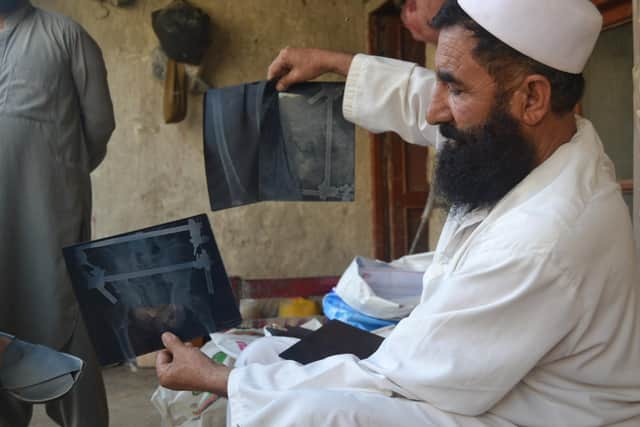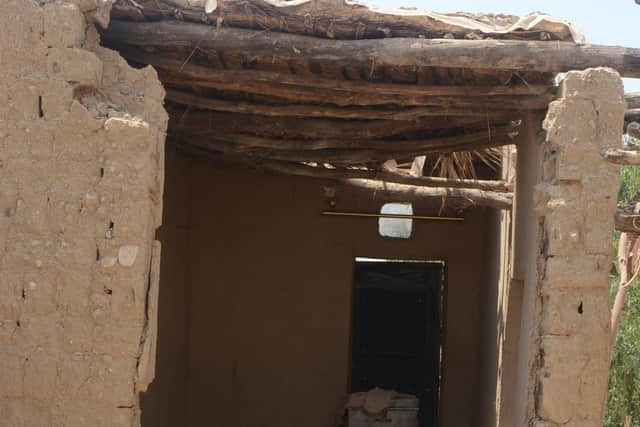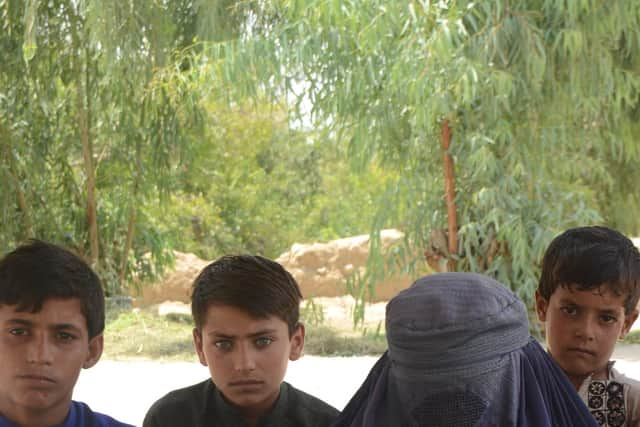'The international community should not forget Afghanistan': aid workers appeal to the world as the country heads towards humanitarian disaster
“I will bear hunger and face all difficulties of life, but I hope my children have a bright future, become educated and live less painful lives,” she says.
Yet, under Taliban rule, that hope is becoming increasingly unlikely. Of her four daughters, two were educated to sixth grade – around age 11 – the others only to fourth grade.
Advertisement
Hide AdAdvertisement
Hide AdGirls' schools remain closed for grades seven to 12 in most parts of the country as progress made for women’s rights under the previous government has halted. Her sons, however, attend a private school, funded by scholarships for children who have lost a parent: their father died nine years ago after being shot by the Taliban.


"I don’t have a breadwinner and no source of income now,” she explains. “Two of my sons eke out a small living collecting cans and plastic bottles in the village. They both make roughly around half a dollar if they scavenge enough recyclables.”
The Taliban, which previously ruled the country from 1996, was ousted by US troops in 2001. However, when the US-led allies completed their withdrawal from Afghanistan in August last year, the group quickly moved in. The country’s then president and his cabinet fled and citizens flooded the airport, desperate to leave. In this second claim on power, the Taliban took in control of all of Afghanistan - something they had not managed to do previously.
Some of those now in charge of the country are still classified by the US as terrorists and sanctions against them have stopped almost all foreign investment. The international community has also frozen around $10 billion of Afghanistan’s assets, until the Taliban gives assurances on security, governance and human rights, including allowing all girls to be educated. Under the current leadership, most women cannot work – if they do, they are required to take a male chaperone, which is, in practice, impossible - and cannot go on long-distance journeys without a male chaperone. Although they are not required to wear the burka at all times, they do have to cover their faces in public.
Aid organisations have warned that the country is in crisis and conditions are getting worse, due to a combination of factors, but also a series of natural disasters, which has hit struggling communities hard.


Global humanitarian agencies have provided assistance, but struggle with access and funding in their battle to avoid a humanitarian disaster. Around 20 people were killed in floods this week, coming after droughts and an earthquake earlier this year which killed 1,000. The Taliban has taken the unusual step of asking the international community for help.
Estimates from the United Nations refugee agency, UNHCR, show around nine million people in Afghanistan are at risk of famine, while over 20 million people – half of the 40 million population - face “extreme levels of hunger”.
Bibi’s family struggle to find enough to eat, surviving on a limited diet of bread and tea, vegetables, okra, and a mix of fried onion and water known as piyawa. She was forced to sell her dairy cow - the family’s only source of income – as she could not afford basic food for her children.


Advertisement
Hide AdAdvertisement
Hide Ad"I also sometimes get help from the village chief and my in-laws,” she says. “My children would never survive without their help. We’ve never been able to afford meat, beans and fruits. Many villagers are poor and neighbours can’t reach out to us.
“If my son could be taken to a foreign country like Germany, it would help the rest of us. I myself harbour no hopes of living outside Afghanistan. I just dream of having a safe living room for all of us.”
Mostaqim, 53, does not receive local help to feed his four daughters and teenage son – as he belongs to a tribe in a separate village, but lives in a home passed down to him from his grandfather.
"[The village chief] only distributes donations among his relatives as he has full control over who receives aid,” he says. “It seems that I can never get support in this village.”
Mostaqim has been unable to work since being injured in a suicide bombing attack in Rodat district seven years ago. He says he was in hospital for years and still receives treatment and has undergone multiple surgeries for his injuries.
He says: "Before Taliban last year, when I still couldn’t work, friends and family used to help us by giving us food items like flour, cooking oil and rice. But now, none of them can help us, because they themselves grapple with economic difficulties after Taliban seized Afghanistan. Since August last year, I am barely able to afford the cheapest food. My malnourished children are mostly hungry.”
Aid organisations have called for sanctions against the Taliban to be lifted, saying they are harming ordinary people in the country.
Christian Aid’s head of global advocacy and policy, Fionna Smyth, said: "A year on we have no illusions about the Taliban rulers but the Afghan people cannot be abandoned to their fate. They did not vote for the Taliban and, even if the Taliban control the country, that must not stop us trying to help people make a living and give them hope for a future free from hunger.“Christian Aid is already delivering humanitarian assistance but no NGO can do the job of the Government. Conditions are becoming even more desperate due to the impact of climate change, a global pandemic and soaring food and fuel costs due to the war in Ukraine. Those needs are going to grow as summer ends and we approach the winter months.She added: “That is why the international community needs to do far more to support the economy to get back on its feet, get the central bank going again and also advocate for the rights of women and girls, who are being erased from public life."
Advertisement
Hide AdAdvertisement
Hide AdSubrata, country manager for the charity, which is known as CAID in Afghanistan, can only be identified by his first name for fear of retribution from the Taliban. He warns the country is heading towards a major humanitarian disaster.
He points to stories such as that of Bibi and her family.
“These stories are basically a depiction of the ground level situation,” he says. “Situations which generally are not allowed to be presented in front of an international audience. These are realities. The life [of women] is becoming much more tough, much more narrow, and the options of getting out of that kind of poverty becoming even less.
"Women who do not have men will always be economically incompetent because of the system and now the humanitarian response is also being compromised by Taliban authorities.”
He adds: “It would be wrong of me to say that before the Taliban, Afghan ladies lived like women in a Western society. In the name of religion and culture, they had to follow a lot of restrictions which men did not have, but after last August, those restrictions were legalised and put into statute and when you do that, the situation on the ground becomes even more tight.”
The Scottish Government has committed just over £600,000 in humanitarian funding for Afghanistan through different channels. This was split between the DEC (Disasters Emergency Committee), Christian Aid & Islamic Relief – a joint project funding emergency food parcels and hygiene kits in Nangarhar Province - and Tearfund, for emergency food parcels and winter blankets.
Subrata calls for the international community to ease sanctions to help ordinary Afghan people – and also to ensure that the humanitarian disaster is not forgotten as the world turns its attention to the Ukraine invasion.
He says: “The international community should work out some mechanism to bring the Afghan economy back on track. The banking system has to be open otherwise, this humanitarian work which we are doing is a life saving activity, it is not a development activity.”
He adds: “Here also, people are in very, very bad situations, but the international community are not getting to know, because of the [Taliban] media ban. The international community should not forget Afghanistan.”
Comments
Want to join the conversation? Please or to comment on this article.
